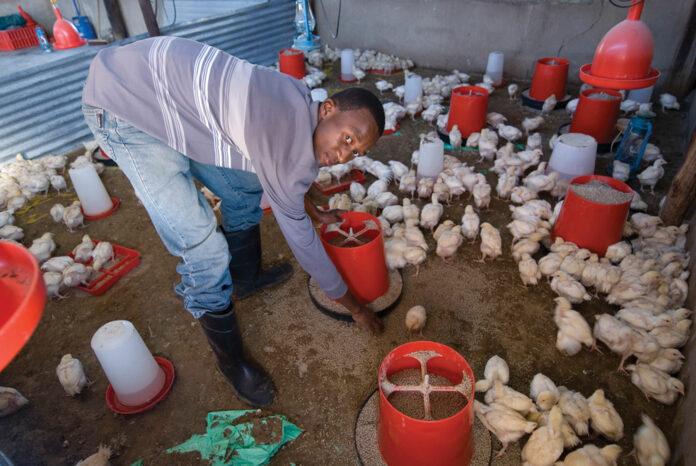Africa-Press – Botswana. The Government has indicated that the country has reached self-sufficiency in the production of poultry products despite insistent high import bill on food products.
When speaking at the Irvine’s feed mill official opening on Friday this week, President Mokgweetsi Masisi highlighted that even though there has been an improvement in the poultry space, there is need to shift attention towards curbing the high food import bill which gobbles one billion pula per month.
Irvine’s was established in the 1950s and currently has a regional footprint in Zimbabwe, Mozambique, Tanzania, and Botswana. The company’s operations in Botswana began in 2002 with a Hatchery situated in Francistown. To promote sustainable growth in the local poultry industry, Irvine’s invested in a state-of-the-art feed mill in Mmamashia with a capacity of 90 000 tons of feed annually. Modern equipment, cutting edge technology and the implementation of global best practice have ensured that Irvine’s produces high quality products that compete internationally and that benefit Botswana growers and the economy.
“I am delighted to be officially launching Irvine’s Botswana feed mill as it comes at an opportunity time when government is coming up with key initiatives to close the existing gaps in the Agricultural sector in order to achieve the food self-sufficiency and also to become a net exporter of Agricultural products,” Masisi said on Friday.
“The sector in its entirety has an enormous potential to catalyze growth post the Covid-19 pandemic,” said Masisi.
He further highlighted that farmers should take a leaf from the Irvine’s story in order to help the country to cut on the import bill, adding that the Irvine business has invested P150 million.
“It is therefore gratifying to witness the resurrection of the many small poultry business which were facing collapse in the early 2000’s,” said Masisi.
It is estimated that that in Botswana the small-scale farming sector produces over 11 million chickens per year generating over P678 million in annual revenue.
Masisi stated that it should be noted that Irvine’s poultry production contributes to 50% of all chicken meat consumed in Botswana.
He said the value and quantity of chicken is even much bigger than that of beef.
“Government remains committed to ensuring economic diversification, employment creation and food security and it will do everything in its power to support the private sector through the creation of enabling environment for businesses to thrive,” said Masisi.
According to a Statistics Botswana report titled Botswana Food Imports March 2022, food imports contributed P 1, 173, 829, 205 (over P1 billion) translating to 11.9 percent of the total import bill. Cereals which are noted to be “grain sorghum other than seed and maize (corn)” account for 26.8 percent of food imports. The hefty food import bill simply means that the country relies on its neighbours, South Africa in particular, for food imports.
Looked at from an entrepreneurial angle, this worrisome food import bill also shows that there are immense opportunities for agricultural enterprises to capitalize by investing into such a sector which is dominated by imports. The writing is on the wall and that’s how research data and firms like us intend to add value to businesses by providing them with information which can unlock untapped business potential.
For More News And Analysis About Botswana Follow Africa-Press






